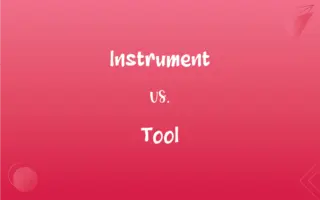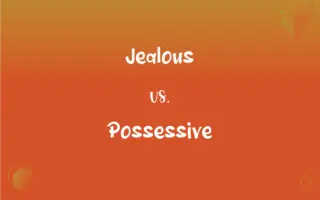Education vs. Intelligence: What's the Difference?
Edited by Janet White || By Aimie Carlson || Published on December 31, 2023
Education is the formal process of acquiring knowledge and skills, while intelligence is the innate ability to understand, learn, and apply knowledge.

Key Differences
Education is a structured system of formal instruction typically conducted in schools, colleges, or universities. It involves the systematic teaching of skills, values, and knowledge. Intelligence, on the other hand, refers to the cognitive ability of an individual to learn, reason, problem-solve, and adapt to new situations.
In the realm of education, curriculum and pedagogy play crucial roles in imparting information and skills. It is a measurable, certificate-based system. Intelligence is less tangible, often assessed through observations, IQ tests, and the ability to grasp complex concepts and make logical connections.
Education can influence and enhance an individual's intelligence by providing resources and opportunities to learn and think critically. However, the level of intelligence can affect how efficiently and effectively a person absorbs and applies educational content.
Education often focuses on knowledge and skills pertinent to specific disciplines and societal needs, and it evolves with cultural and technological changes. Intelligence, while it can be nurtured and developed, is considered to be more innate, encompassing creativity, emotional understanding, and logic.
The value of education lies in its ability to provide a foundation for lifelong learning and societal contribution. Intelligence is valued for its role in personal development, problem-solving, and the capacity to adapt to changing environments.
ADVERTISEMENT
Comparison Chart
Nature
Formal and structured
Innate and adaptable
Measurement
Degrees, diplomas, certificates
IQ tests, problem-solving ability
Focus
Knowledge acquisition, skill development
Cognitive abilities, reasoning
Development
Through instruction and experience
Enhanced through learning and experience
Role
Prepares for societal roles, professions
Facilitates understanding, adaptation
ADVERTISEMENT
Education and Intelligence Definitions
Education
The theory and practice of teaching.
She pursued a degree in education to become a high school teacher.
Intelligence
The ability to acquire and apply knowledge and skills.
Her intelligence was evident in her quick mastery of new languages.
Education
The process of receiving or giving systematic instruction, especially at a school or university.
Her education at the prestigious university prepared her for a successful career.
Intelligence
The ability to learn or understand things or to deal with new or difficult situations.
His intelligence allowed him to solve complex mathematical problems with ease.
Education
An enlightening experience.
His trip abroad was an education in cultural diversity.
Intelligence
The collection of information of strategic or tactical importance.
Military intelligence was crucial in making informed decisions during the war.
Education
The field of study concerned with pedagogy and the learning process.
She authored several papers on education reform.
Intelligence
The act of understanding; comprehension.
His intelligence of the subject was clear during the discussion.
Education
A body of knowledge acquired while being educated.
His education in the sciences led him to a fascination with astrophysics.
Intelligence
Mental acuity, sharpness, and cleverness.
Her intelligence in handling tricky negotiations was admired by her colleagues.
Education
The act or process of educating or being educated.
Intelligence
The ability to acquire, understand, and use knowledge
A person of extraordinary intelligence.
Education
The knowledge or skill obtained or developed by a learning process.
Intelligence
Information, especially secret information gathered about an actual or potential enemy or adversary.
FAQs
What is the primary goal of education?
To impart knowledge and develop skills necessary for personal and professional growth.
Can intelligence be improved through education?
Yes, education can enhance various aspects of intelligence, such as critical thinking and problem-solving skills.
Is education only obtained in schools?
No, education can also occur through life experiences, self-study, and informal teachings.
Does intelligence affect learning ability?
Yes, higher intelligence can make learning new concepts and skills easier.
How is intelligence typically measured?
Through standardized tests like IQ tests, which assess various cognitive abilities.
Can education influence emotional intelligence?
Yes, education can improve emotional intelligence by teaching empathy, communication skills, and self-awareness.
Is intelligence solely determined by genetics?
Genetics play a role, but environmental factors and education also significantly influence intelligence.
What role does curiosity play in education?
Curiosity drives the desire to learn and explore, enhancing the educational process.
Is practical intelligence the same as academic intelligence?
No, practical intelligence involves real-world problem-solving and adaptability, which differs from academic learning.
Is formal education necessary for success?
Not necessarily, as success can be achieved through various means, including vocational training or self-taught skills.
How does education impact a society?
It leads to an informed populace, better employment opportunities, and contributes to economic growth.
Are there different types of intelligence?
Yes, such as logical-mathematical, linguistic, spatial, and emotional intelligence.
Can someone be intelligent without formal education?
Yes, intelligence can manifest in various forms, not just in academic settings.
How can one improve their intelligence?
Through continuous learning, challenging one's mind, and engaging in diverse intellectual activities.
Can lack of education hinder intelligence development?
Limited educational opportunities can constrain the development of certain intellectual skills.
Does everyone have the same potential for education and intelligence?
Individuals vary in their potential due to a combination of genetic, environmental, and personal factors.
Does education always lead to better decision-making?
Education provides the tools for informed decision-making, but it does not guarantee better choices.
Is creativity a part of intelligence?
Yes, creativity is considered an aspect of intelligence, particularly in problem-solving and innovative thinking.
Does a higher education guarantee a higher intelligence?
Not necessarily, as intelligence encompasses more than academic knowledge and includes problem-solving and adaptive skills.
Are IQ tests the only way to measure intelligence?
No, other methods include assessments of emotional, creative, and practical intelligence.
About Author
Written by
Aimie CarlsonAimie Carlson, holding a master's degree in English literature, is a fervent English language enthusiast. She lends her writing talents to Difference Wiki, a prominent website that specializes in comparisons, offering readers insightful analyses that both captivate and inform.
Edited by
Janet WhiteJanet White has been an esteemed writer and blogger for Difference Wiki. Holding a Master's degree in Science and Medical Journalism from the prestigious Boston University, she has consistently demonstrated her expertise and passion for her field. When she's not immersed in her work, Janet relishes her time exercising, delving into a good book, and cherishing moments with friends and family.







































































